
The economy of Mauritania is still largely based on agriculture and livestock, even though most of the nomads and many subsistence farmers were forced into the cities by recurring droughts in the 1970s and 1980s.
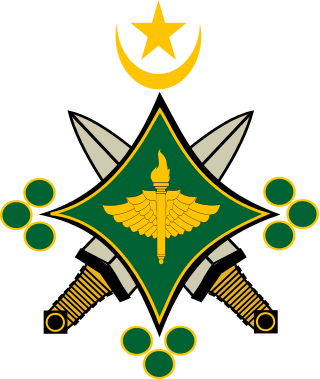
The Armed Forces of Mauritania is the defence force of the Islamic Republic of Mauritania, having an army, navy, air force, gendarmerie, and presidential guard. Other services include the national guard and national police, though they both are subordinated to the Ministry of the Interior. As of 2018, the Mauritanian armed forces budget was 3.9% of the country's GDP.

Western Sahara is a disputed territory on the northwest coast of Africa. About 20% of the territory is controlled by the Sahrawi Arab Democratic Republic (SADR); the remaining 80% is occupied and administered by neighboring Morocco. It has a surface area of 266,000 square kilometres (103,000 sq mi). It is the second most sparsely populated country in the world and most sparsely in Africa, mainly consisting of desert flatlands. The population is estimated at about 500,000, of which nearly 40% live in Morocco-controlled Laayoune, the largest city in Western Sahara.

Nouakchott is the capital and largest city of Mauritania. Located in the southwestern part of the country, it is one of the largest cities in the Sahara. The city also serves as the administrative and economic center of Mauritania.
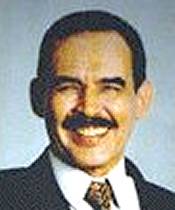
Maaouya Ould Sid'Ahmed Taya is a Mauritanian military officer who served as the President of Mauritania from 1984 to 2005. During his presidency, he pursued policies of Arab nationalism while deepening ties with the United States.

Col. Mohamed Khouna Ould Haidallah was the head of state of Mauritania from 4 January 1980 to 12 December 1984.
Contributing to the establishment of human rights system in Africa are the United Nations, international law and the African Union which have positively influenced the betterment the human rights situation in the continent. However, extensive human rights abuses still occur in many sections of the continent. Most of the violations can be attributed to political instability, racial discrimination, corruption, post-colonialism, economic scarcity, ignorance, illness, religious bigotry, debt and bad financial management, monopoly of power, lack/absence of judicial and press autonomy, and border conflicts. Many of the provisions contained in regional, national, continental, and global agreements remained unaccomplished.

Slavery has been called "deeply rooted" in the structure of the Northwestern African country of Mauritania and estimated to be "closely tied" to the ethnic composition of the country, although it has also been estimated that "Widespread slavery was traditional among ethnic groups of the largely nonpastoralist south, where it had no racial origins or overtones; masters and slaves alike were black", despite the cessation of slavery across other African countries and an official ban on the practice since 1905.
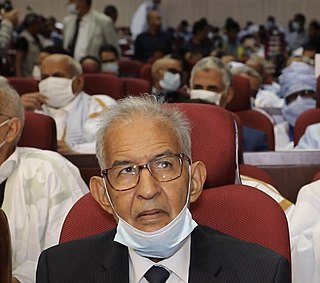
Ahmed Ould Daddah is a Mauritanian economist and a politician. He is a half-brother of Moktar Ould Daddah, the first President of Mauritania, and belongs to the Marabout Ouled Birri tribe. He is currently the President of the Rally of Democratic Forces (RFD) and was designated as the official Leader of the opposition following the 2007 presidential election, in which he placed second.
Saleh Ould Hanenna is a former Mauritanian soldier and political figure.

Lesbian, gay, bisexual, and transgender (LGBT) people in Mauritania face severe challenges not experienced by non-LGBT residents. Both male and female kinds of same-sex sexual activity are illegal in Mauritania. Openly homosexual Muslim men face stoning to death, though there have been no known cases of executions caused by homosexuality charges in the country; whereas women who have sex with women face prison.

An Islamist insurgency is taking place in the Maghreb region of North Africa, followed on from the end of the Algerian Civil War in 2002. The Algerian militant group Salafist Group for Preaching and Combat (GSPC) allied itself with al-Qaeda to eventually become al-Qaeda in the Islamic Maghreb (AQIM). The Algerian and other Maghreb governments fighting the militants have worked with the United States and the United Kingdom since 2007, when Operation Enduring Freedom – Trans Sahara began.
In December 1984, Haidallah was deposed by Colonel Maaouya Ould Sid'Ahmed Taya, who, while retaining tight military control, relaxed the political climate. Ould Taya moderated Mauritania's previous pro-Algerian stance, and re-established ties with Morocco during the late 1980s. He deepened these ties during the late 1990s and early 2000s as part of Mauritania's drive to attract support from Western states and Western-aligned Arab states. Mauritania has not rescinded its recognition of Polisario's Western Saharan exile government and remains on good terms with Algeria. Its position on the Western Sahara conflict has been, since the 1980s, one of strict neutrality.

Mohamed Ould Abdel Aziz is a former Mauritanian politician who was the 8th president of Mauritania from 2009 to 2019.

Mauritania, officially the Islamic Republic of Mauritania, is a sovereign country in Northwest Africa. It is bordered by the Atlantic Ocean to the west, Western Sahara to the north and northwest, Algeria to the northeast, Mali to the east and southeast, and Senegal to the southwest. By land area, Mauritania is the 11th-largest country in Africa and the 28th-largest in the world, and 90% of its territory is situated in the Sahara. Most of its population of approximately 4.3 million lives in the temperate south of the country, with roughly one-third concentrated in the capital and largest city, Nouakchott, located on the Atlantic coast.
Diabaly is a small town and rural commune in the Cercle of Niono in the Ségou Region of Mali. The commune has an area of approximately 1,538 square kilometres (594 sq mi) and includes 28 villages as well as the town. In the 2009 census the commune had a population of 35,266. The town lies 50 kilometres (31 mi) north of Niono on the west side of the Fala de Molodo channel that forms part of the Office du Niger irrigation scheme. The fields around the town are irrigated but much of the commune lies to the east of the Fala de Molodo in an area that lacks irrigation.
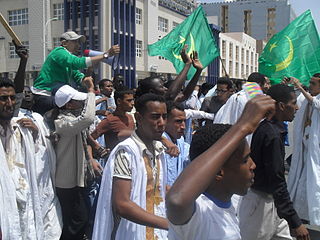
The 2011–2012 Mauritanian protests were a series of protests in Mauritania that started in January 2011, influenced by and concurrent with the Arab Spring, and continued into 2012. The mostly peaceful protest movement demanded that President Mohamed Ould Abdel Aziz institute political, economic, and legal reforms. Common themes of protest centered around civil-military relations, slavery, other human rights abuses the opposition accused the government of perpetrating, and economic issues. The protests began after the self-immolation of Mohamed Bouazizi and continued in what would come to be known as the February 25th Movement. Other protests, such as those against the census and student movements calling for Aziz's resignation, continued throughout 2011 and into 2012. As in other countries impacted by the Arab Spring, protestors used social media to coordinate and publicize demonstrations. The reaction of Mauritanian authorities to these protests varied, oscillating between explicit approval, ambivalence, and violent repression.
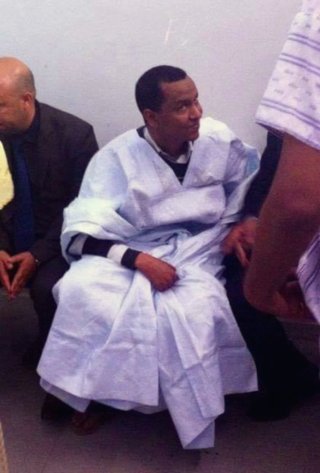
Mohamed Cheikh Ould Mkhaitir is a Mauritanian blogger who was a political prisoner from 2014 to 2019. He was sentenced to death after he wrote an article critical of Islam and the caste system in Mauritania, after which he became a designated prisoner of conscience by Amnesty International. He now lives in exile in France due to concerns for his safety.

The Anglophone Crisis, also known as the Ambazonia War or the Cameroonian Civil War, is an ongoing armed conflict between Cameroon Armed Forces and armed separatist groups, part of the long-standing Anglophone problem. Following the suppression of 2016–17 protests by Cameroonian authorities, separatists in the Anglophone regions launched a guerrilla campaign and later proclaimed independence. Within two months, the government of Cameroon declared war on the separatists and sent its army into the Anglophone regions.
The following lists events that happened during 2020 in West Africa.













